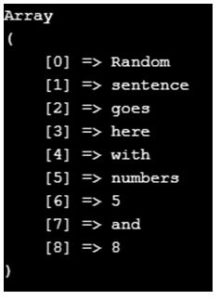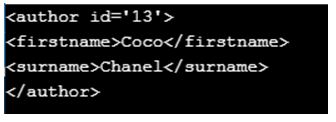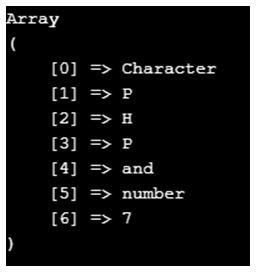PHP sscanf()
The sscanf() is a pre-defined function in PHP which returns parsed input string after parsing it as per the required format. It takes the input of 2 parameters and gives us the required array and in other case when other parameters are passed such as optional ones, the data parsed will be stored in them. It throws an error when there are more specifiers than the variables to contain these and the extra variables will get NULL if there are lower specifiers present than the variables.
Start Your Free Software Development Course
Web development, programming languages, Software testing & others
Syntax of PHP sscanf()
Given below is the syntax of PHP sscanf():
sscanf(input_string, format, arg1, arg2, arg3....)
Input Parameters:
1. input_string: This is the input string to be read.
2. format: We can specify the formats as per the below list as required:
- %%: This format will be in percent sign.
- %c: This format returns the character as per the ASCII values required.
- %d: This format is for signed decimal value. (Can be zero, negative or positive)
- %e: This format returns scientific notation in lower case. (e.g. 1.2e+2)
- %u: Used for representing unsigned decimal number which is either equal to or greater than zero.
- %f: This is used to represent a floating point number.
- %o: This is used to represent an octal number.
- %s: This represents string format.
- %x: This represent lower case letters for a hexadecimal number.
- %X: This represent uppercase letters for a hexadecimal number.
There are also a few additional format values which are placed between the % symbol and the letter we give. (For example %0.3f)
- + (This forces both + and – values in the beginning of numbers and there are only negative values marked by default).
- ‘ (This describes as to what to be used as a padding and space is the default value here. This should be used along with the width specifier. For example: %x30s which uses x for padding).
- – (This on the left will give us the variable value).
- [0-9] (This gives the minimum width which is held by the variable value).
- . [0-9] (This describes the total number of decimal numbers or the maximum length of the string).
- arg1: This is an optional parameter and also the first variable we store data into.
- arg2: This is also optional and the second variable we store data.
- arg++: This is optional and represents the successive variables we continue storing our data in.
Return values: Here there are 2 cases which can happen:
- If there are only 2 values which are given as input parameters to this function then the data will be returned in the form of an array.
- If other optional parameters are passed then the parsed data are stored in them.
- If there are multiple specifiers exceeding the variables that can contain them then an error is thrown.
- If there are less specifiers than the variables which they can contain, then NULL will be assigned to those variables.
- -1 will be returned if more specifiers are present than in the expected format.
Examples of PHP sscanf()
Given below are the examples mentioned:
Example #1
Code:
<?php $text = "Random sentence goes here with numbers 5 and 8"; $f = sscanf($text,"%s %s %s %s %s %s %d %s %d"); print_r($f); ?>
Output:

In this example we are specifying a text as required. Then using the sscanf function and specifying the correct formats which represents our input string. Hence in the output the exact string is displayed as an array. This only if the format matches the data.
Example #2
Code:
<?php
// fetching the unique ID of product
list($ID) = sscanf("SN/680001", "SN/%d");
// fetching date of manufacturing
$manf = "March 03 2001";
// fetching the date of expiry
$expiry = "March 03 2002";
// Parsing using sscanf function
list($mon, $day, $yr) = sscanf($manf, "%s %d %d");
list($mon, $day, $yr) = sscanf($expiry, "%s %d %d");
echo "Product $ID was manufactured on $manf and will expire on: $yr-" . substr($mon, 0, 3) . "-$day\n";
?>Output:

In this example we are displaying how to check and display the product information like its Unique manufacturing ID and the date of expiry. So in the first parameter we are fetching the ID information and parsing it in %d format. Next we are fetching the manufacturing date and expiry date of the product and parsing the same as required format using sscanf function. Then displaying all the parsed things in one sentence. Multiple things can be added here to display the information we want.
Example #3
Code:
<?php // Fetching designer info and to generate DressInfo entry $design = "13\tCoco Chanel"; $str = sscanf($design, "%d\t%s %s", $ID, $firstname, $lastname); // Displaying all the above details after formatting echo "<author id='$ID'> <firstname>$firstname</firstname> <surname>$lastname</surname> </author>\n"; ?>
Output:

In this example we are using sscanf function to first parse the ID and name of the designer. Then displaying the same in HTML format by splitting the names into first name and last name.
Example #4
Code:
<?php // We are initializing the string here $arr = "Character PHP and number 7"; // Parsing the input string according to different format $format = sscanf($arr,"%s %c%c%c %s %s %d"); print_r($format); ?>
Output:

In the above example we are first initializing the string as required and this time including a few character sets in combination with strings. The same we are parsing using the sscanf function.
Conclusion
As seen above in all the examples, sscanf function in PHP is basically used to parse any type of the input string as per the requirements. There are a few cases where this function shows inefficiency to parse the strings, where there may be incorrect output when we try to parse a tab delimited string also having normal spaces in between. It also does not give the expected output if in the code there is a file name with its extension where it finds difficult to separate the two in presence of a “.”.
The above is the detailed content of PHP sscanf(). For more information, please follow other related articles on the PHP Chinese website!

Hot AI Tools

Undresser.AI Undress
AI-powered app for creating realistic nude photos

AI Clothes Remover
Online AI tool for removing clothes from photos.

Undress AI Tool
Undress images for free

Clothoff.io
AI clothes remover

AI Hentai Generator
Generate AI Hentai for free.

Hot Article

Hot Tools

Notepad++7.3.1
Easy-to-use and free code editor

SublimeText3 Chinese version
Chinese version, very easy to use

Zend Studio 13.0.1
Powerful PHP integrated development environment

Dreamweaver CS6
Visual web development tools

SublimeText3 Mac version
God-level code editing software (SublimeText3)

Hot Topics
 1379
1379
 52
52
 PHP 8.4 Installation and Upgrade guide for Ubuntu and Debian
Dec 24, 2024 pm 04:42 PM
PHP 8.4 Installation and Upgrade guide for Ubuntu and Debian
Dec 24, 2024 pm 04:42 PM
PHP 8.4 brings several new features, security improvements, and performance improvements with healthy amounts of feature deprecations and removals. This guide explains how to install PHP 8.4 or upgrade to PHP 8.4 on Ubuntu, Debian, or their derivati
 How To Set Up Visual Studio Code (VS Code) for PHP Development
Dec 20, 2024 am 11:31 AM
How To Set Up Visual Studio Code (VS Code) for PHP Development
Dec 20, 2024 am 11:31 AM
Visual Studio Code, also known as VS Code, is a free source code editor — or integrated development environment (IDE) — available for all major operating systems. With a large collection of extensions for many programming languages, VS Code can be c
 7 PHP Functions I Regret I Didn't Know Before
Nov 13, 2024 am 09:42 AM
7 PHP Functions I Regret I Didn't Know Before
Nov 13, 2024 am 09:42 AM
If you are an experienced PHP developer, you might have the feeling that you’ve been there and done that already.You have developed a significant number of applications, debugged millions of lines of code, and tweaked a bunch of scripts to achieve op
 How do you parse and process HTML/XML in PHP?
Feb 07, 2025 am 11:57 AM
How do you parse and process HTML/XML in PHP?
Feb 07, 2025 am 11:57 AM
This tutorial demonstrates how to efficiently process XML documents using PHP. XML (eXtensible Markup Language) is a versatile text-based markup language designed for both human readability and machine parsing. It's commonly used for data storage an
 Explain JSON Web Tokens (JWT) and their use case in PHP APIs.
Apr 05, 2025 am 12:04 AM
Explain JSON Web Tokens (JWT) and their use case in PHP APIs.
Apr 05, 2025 am 12:04 AM
JWT is an open standard based on JSON, used to securely transmit information between parties, mainly for identity authentication and information exchange. 1. JWT consists of three parts: Header, Payload and Signature. 2. The working principle of JWT includes three steps: generating JWT, verifying JWT and parsing Payload. 3. When using JWT for authentication in PHP, JWT can be generated and verified, and user role and permission information can be included in advanced usage. 4. Common errors include signature verification failure, token expiration, and payload oversized. Debugging skills include using debugging tools and logging. 5. Performance optimization and best practices include using appropriate signature algorithms, setting validity periods reasonably,
 PHP Program to Count Vowels in a String
Feb 07, 2025 pm 12:12 PM
PHP Program to Count Vowels in a String
Feb 07, 2025 pm 12:12 PM
A string is a sequence of characters, including letters, numbers, and symbols. This tutorial will learn how to calculate the number of vowels in a given string in PHP using different methods. The vowels in English are a, e, i, o, u, and they can be uppercase or lowercase. What is a vowel? Vowels are alphabetic characters that represent a specific pronunciation. There are five vowels in English, including uppercase and lowercase: a, e, i, o, u Example 1 Input: String = "Tutorialspoint" Output: 6 explain The vowels in the string "Tutorialspoint" are u, o, i, a, o, i. There are 6 yuan in total
 Explain late static binding in PHP (static::).
Apr 03, 2025 am 12:04 AM
Explain late static binding in PHP (static::).
Apr 03, 2025 am 12:04 AM
Static binding (static::) implements late static binding (LSB) in PHP, allowing calling classes to be referenced in static contexts rather than defining classes. 1) The parsing process is performed at runtime, 2) Look up the call class in the inheritance relationship, 3) It may bring performance overhead.
 What are PHP magic methods (__construct, __destruct, __call, __get, __set, etc.) and provide use cases?
Apr 03, 2025 am 12:03 AM
What are PHP magic methods (__construct, __destruct, __call, __get, __set, etc.) and provide use cases?
Apr 03, 2025 am 12:03 AM
What are the magic methods of PHP? PHP's magic methods include: 1.\_\_construct, used to initialize objects; 2.\_\_destruct, used to clean up resources; 3.\_\_call, handle non-existent method calls; 4.\_\_get, implement dynamic attribute access; 5.\_\_set, implement dynamic attribute settings. These methods are automatically called in certain situations, improving code flexibility and efficiency.




